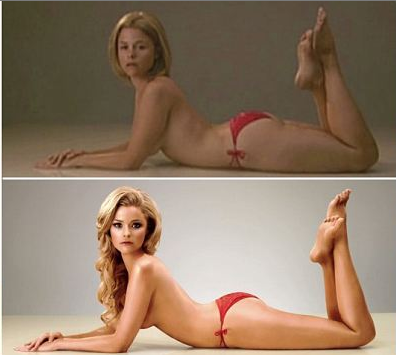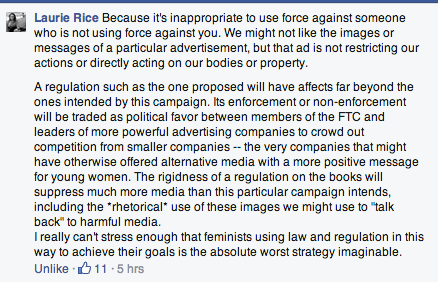Why The Government Shouldn’t Regulate Photoshopping
Women’s representation in media matters. Study after study has linked narrow beauty standards with low self-esteem, eating disorders, and general body-hatred among women. Women are tired of seeing themselves portrayed in a narrow way — light-skinned, thin, blonde, blue-eyed, big boobs, etc. But is government legislation the solution to create more representative media images? 
That’s the question raised by a new Change.org petition, which asks people to sign in support of The Truth in Advertising Act, or H.R.4341. The act is not very detailed, but in short, it would require the Federal Trade Commission (FTC) to create a regulatory framework to reduce the use of altered photos in advertising and “to submit to Congress a report on the use, in advertising and other media for the promotion of commercial products, of images that have been altered to materially change the physical characteristics of the faces and bodies of the individuals depicted.”
This legislation may have good intentions, but it is a very, very bad idea.
First of all, it’s wholly unenforceable — theoretically the FTC would need to comb through every artists’/designers’ creative process prior to publication to determine if the level of Photoshopping is harmful or not. This is not only invasive for artists and businesses alike, but it would be a massive undertaking, and counter-productive to boot.
Keep in mind — each of us sees up to 5,000 advertising messages each day, and more often than not, those include photos. Determining whether individual photos or advertisements meet up with government scrutiny of what is “okay” for us to look at is not my idea of feminism, which advocates for an end to paternalism and limitations on human autonomy.
To fix problematic female media representation, which is indeed an important issue, we don’t need to ask the government to regulate the free exchange of images in the marketplace. The media both reflects and reinforces cultural attitudes — cracking down on the media itself will not change cultural attitudes, which are in fact the root of the problem.
Discourse is the only way we can actually unveil (and begin to subvert) problematic representations of women’s bodies, which are grounded in cultural attitudes interwoven in a patriarchal worldview that places women as ornaments and visual/sexual objects. The representation of women in media today is problematic and non-inclusive, sure — but this is largely a cultural issue and can’t be fixed by strict legislation (read: force). We simply cannot — will not — fix cultural issues with legislative force and limits on creativity — only discourse.
Government regulation won’t end patriarchy, but actually reinforces it with oversight and policies that restrict women’s freedom. For instance, this type of legislation could make it much more difficult for individual female artists — particularly those working in creative fields like photography or design — to enter the marketplace.
Keep in mind: any government legislation is backed up by force. The state enforces laws like this with fines, and if you don’t comply with fines, they’ll put you in a cage.
Laurie Rice and Sloane Shearman sum it up nicely:


If we want to see more realistic representations of women, we have to refuse to buy products or media that use harmful techniques. We have to create alternative media. We have to critique companies that reinforce the status quo — not use government force to censor what we disagree with.
Miss Representation’s #NotBuyingIt campaign shows companies respond to consumer feedback. We must speak out against media that holds women to impossibly high standards, while also advocating for a society that allows expression free from strict government oversight. We need to talk to each other about everything from eating disorders to fat shaming to body policing to non-consensual sexual objectification and beyond. We need to change attitudes.
Let’s reclaim media ourselves, and not rely on the government to do it for us. Maybe taking selfies is a good place to start.
Fantastic article. Thanks so much for quoting me.
Reblogged this on Laurie Rice and commented:
Great piece by Julie Mastrine.
Love it, such truths! Extending critiques of paternalism and patriarchy to the state is key.
Excellent post as always, Julie! Feminists must extend critiques of power, patriarchy, and paternalism to the state.
Reblogged this on amymastrine and commented:
My twin sister nails it in this critique of newly proposed photo manipulation legislation, and explains how it would be impossible to regulate as well as hurt individual artists.